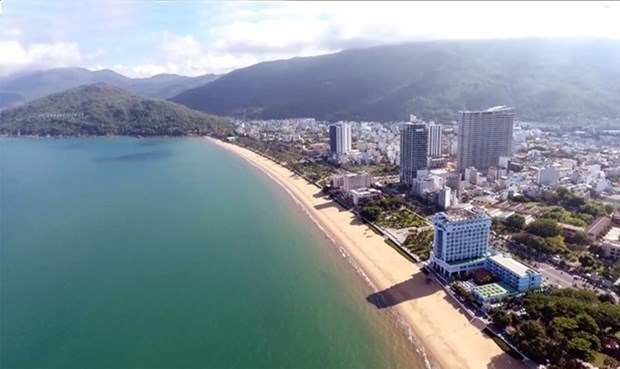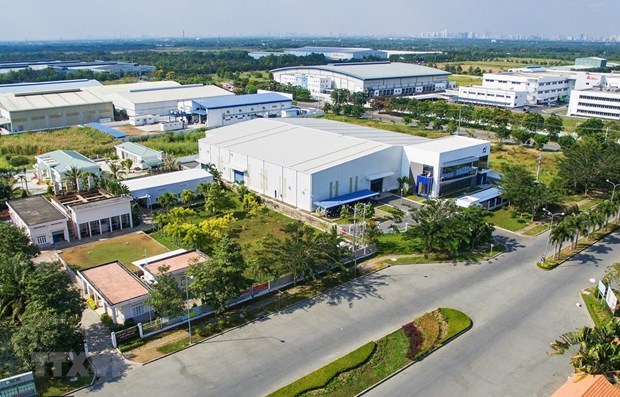Real estate market recovers towards end of 2020 from pandemic-induced hibernation
 Illustrative image (Photo: VNA)
Illustrative image (Photo: VNA)The real estate industry got badly hit by COVID-19 in the first three quarters of 2020 but bounced back by the end of 2020, giving hopes to the market in the coming time.
The Vietnamese property market ended the year 2020 on a high note, bouncing back from a hibernation caused by the COVID-19 pandemic in the first three quarters.
Industry insiders said COVID-19 had hit the sector really hard and many segments froze. However, from the middle of the third quarter, the real estate market began to recover with industrial real estate emerging as a new bright spot.
“Double hit” causing multiple problems
The outbreaks of COVID-19 in the beginning of 2020 served the first blow on the real estate market, causing disruptions to business plans. The market, which had been in short supply for a long time since 2019, fell into an inactive phase with an unprecedented decline in transactions.
According to statistics from the Credit Department under the State Bank of Vietnam, in the first quarter of 2020, outstanding loans in real estate only increased by 4.59 trillion VND, or 0.88 percent from the previous quarter, much lower than the 3.48-percent increase at the end of 2019.
The reason behind the decrease is the downturn in the market due to the complicated development of the COVID-19 pandemic.
The Ministry of Construction’s statistics showed commercial housing sales in the second quarter of 2020 only reached 14 percent, equal to only about 40 percent of the figure of same period in 2019; successful transactions decrease by 36.6 percent compared to Q4 2019 and equal to only about 14 percent of 2019.
Vacation property suffered the most. In the first nine months of 2020, more than 4,000 condotel units were put on the market but the number of transactions was negligible.
According to statistics from Vietnam Association of Realtors, up to two-thirds of the projects with products being listed on the market saw no transaction at all. Leading areas in the condotel market such as Khanh Hoa, Da Nang, Quang Ninh, Phu Quoc... all posted very low numbers of transactions.
The key reason leading to the reduction is the ambiguous legal framework for the condotel product and COVID-19 impacts on the economy with tourism taking the hardest hit.
The secondary apartment market also witnessed a major plunge as many investors had problem with cash flow and had to sell off properties at low price despite losses in order to repay bank loans. The rental market saw a sharp drop in prices, especially properties in the Old Quarter and downtown areas, with few tenants.
 Industrial properties see a strong rise in searches (Illustrative image: VNA)
Industrial properties see a strong rise in searches (Illustrative image: VNA)Rays of light on the market
However, the market began to wake up following the hibernation period, with some big developers introducing new real estate products in the fourth quarter. One of the obvious moves was the strong cash flow into the real estate investment channel after banks cut the deposit interest rates to the lowest ever. Seizing the opportunity, many investors launched attractive offers in large projects with real value and great liquidity.
Right in the fourth quarter of 2020, the Government also took action such as issuing Resolution 164 to remove obstacles to investment in urban areas, which was hoped to create more development opportunities. The revised Law on Investment, that took effect on January 1, 2021, is also expected to remove most of the legal obstacles for the real estate market.
Can Van Luc, BIDV's chief economist, said that the reduction in home loan interest rates, plus the introduction of many reasonable promotion packages, also bring many favourable opportunities for both investors and customers wishing to own houses.
According to Jones Lang Lasalle Vietnam, existing domestic industrial parks are gradually being filled up. Besides, with the increase in foreign investment capital (FDI) over the years, international investors have continuously poured capital into industrial parks, hence opening up more opportunities for Vietnam's industrial real estate to really "take off" in the future.
Explaining why Vietnam has become a "bright spot" for industrial real estate investment, Savills said the wages in the manufacturing industry are still quite cheap; the cost of building factories and warehouses is also cheaper than in other Asian countries such as China, India, Indonesia; Vietnam also boasts favourable geographical position as a transit point for goods. Therefore, Vietnam has great advantages for import and export of goods and logistics development./.













